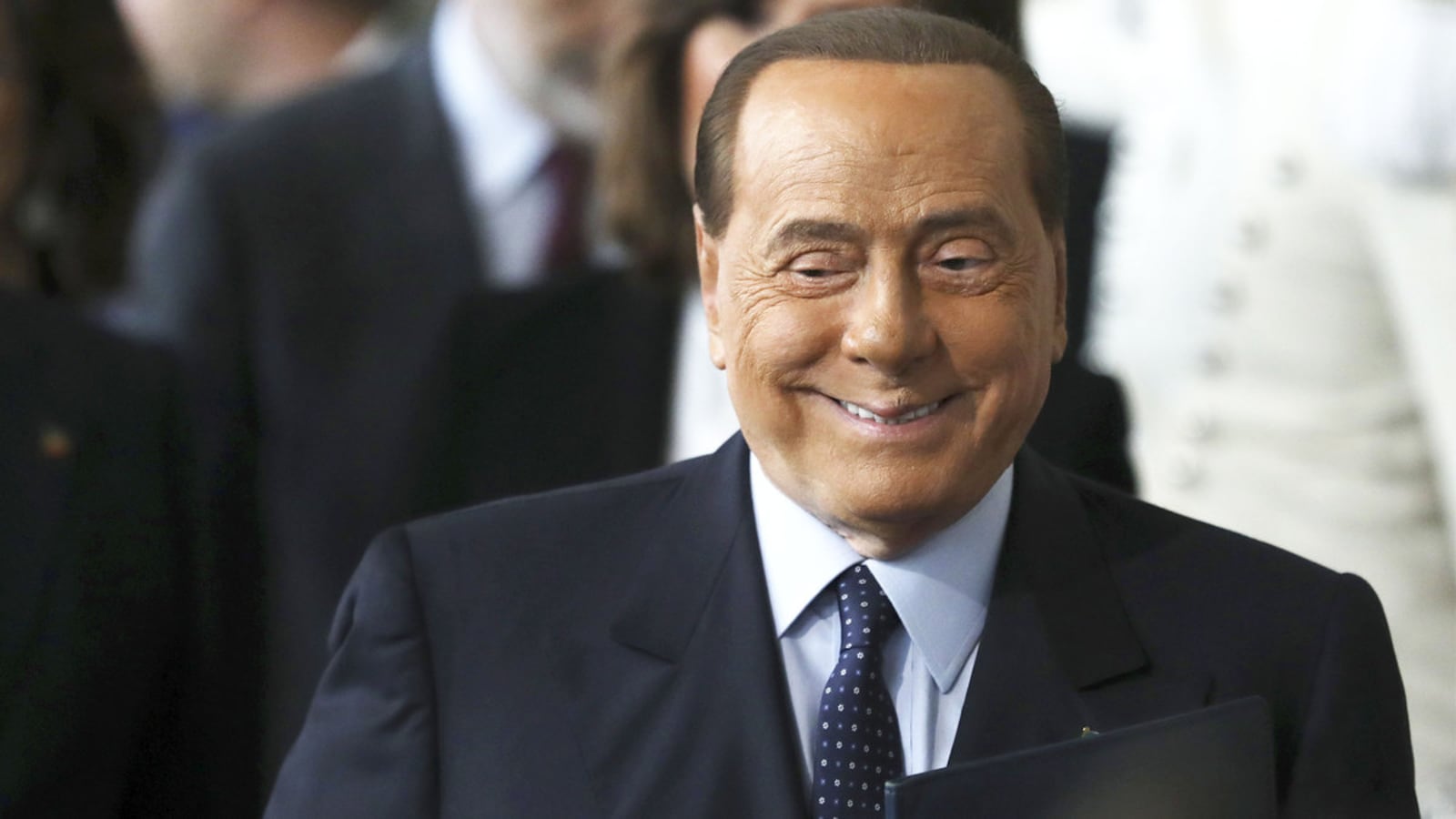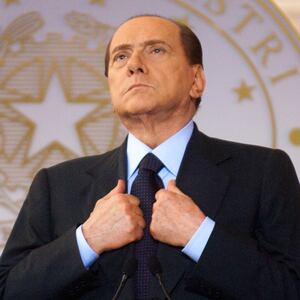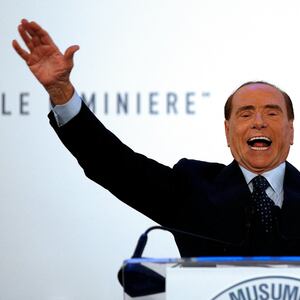ROME—Love him or hate him, Silvio Berlusconi, who has died at the age of 86, will go down in history as one of Italy’s most influential leaders. The enduring success of the permatanned, gaffe-prone billionaire defied all logic, but he also defined what it was to be Italian from the moment he came to power in 1994 until his death this week.
The long-time Italian leader was admitted to the San Raffaele Hospital in Milan on Friday after months of treatment for chronic leukemia. His television network Mediaset announced his death on Monday.
Berlusconi was a self-made man in a country where political and financial success rarely comes to those who don’t inherit it. He started his career as a door-to-door vacuum-cleaner salesman and he played upright bass and worked for a stint as a cruise-ship crooner before entering real estate. He graduated from Milan University with a law degree in 1961, focusing on advertising law. Shortly after, he set up his first company, Edilnord, with questionable funding that was rumored to be tied to organized crime. Many of his associates during this lengthy career were tried and convicted of mafia collusion, but Berlusconi, who earned the nickname Teflon Don, was often investigated, but never convicted of mafia ties.
He is credited with building the first middle-class housing development in suburban Milan in the 1960s. The project, called Milano Due, offered affordable, trendy housing to up-and-coming business magnates who could not afford expensive apartments in the city center.
In 1965, he married the first of his two wives, Carla Elvira Dall’Oglio, with whom he had two children. They divorced in 1985. She never spoke badly about him and he never spoke about her. Their children, Marina and Pier Silvio, are at the core of his business enterprise.

Muammar Gaddafi is greeted by Silvio Berlusconi in Rome in 2009. Gaddafi was making his first visit to Libya’s former colonial ruler, Italy.
ReutersIn 1973, Berlusconi changed Italian society forever with the advent of the country’s first cable-television company. Before that, Italians were fed a stream of public broadcasting programming that reflected the ruling government, which did and still does appoint the board of directors. He eventually turned his first company into the media conglomerate Mediaset, which made him a millionaire. He introduced game shows and news programs with scantily clad women, and is widely criticized for enduring sexism on Italy’s television programming.
As his fortunes grew, he diversified his investments, buying the AC Milan soccer team, the Medusa film company, and Mondadori publishing. In 1990, he married his second wife, Veronica Lario, whom he became enamored with after seeing her perform topless at a theatrical stage play. They had three children, Barbara, Eleanora, and Luigi, none of whom are as entrenched in his business dealings as the children from his first marriage. Lario filed for divorce in 2009, when he became embroiled in a string of sex scandals, including attending the 18th birthday party of a young showgirl who called him “Daddy” for bolstering her acting career. He was initially ordered to pay Lario $3.3 million a month, which was cut in half on appeal. In 2017, a judge ruled in his favor that he did not need to pay her any more alimony at all, which she was still contesting when he died.

Silvio Berlusconi and his then-wife Veronica Lario pose with President George W. Bush his wife, Laura, in Italy in 2004. Thousands of armed police lined the streets of the Italian capital as activists gathered to protest against the visiting president and the U.S.-led occupation of Iraq.
ReutersIn 1994, Berlusconi entered the political stage with the creation of his center-right party Forza Italia, named after the popular soccer chant his team’s fans often yelled at games. He often called his foray a sacrifice or an obligation for the “good of the country.” He was handily elected as prime minister that year, just as a string of criminal investigations into his business dealings kicked off. He was investigated more than a dozen times and in six cases, he passed legislation that changed the statute of limitations that led to the dismissal of cases against him.
His center-right coalition fell in 2001, but he would easily win the premiership twice more in his long career. In 2006, he lost to left-wing leader Romano Prodi, but won his third and final term as prime minister in 2008 under a new party called the People of Freedom.
Berlusconi was good friends with Vladimir Putin, who famously gave him a bed with curtains on which he allegedly bedded a call girl who taped the encounter, including Berlusconi telling her to “wait on the big bed, Putin’s bed.” He often met the Russian leader in Milan or hosted him at his estate on Sardinia, where his parties were notoriously raunchy and often involved world leaders in compromising situations.
In October 2010, he was accused of paying an underage Moroccan girl who worked under the stage name Ruby the Heartstealer for sex. She was a regular fixture at his “bunga bunga” parties he held in the basement of his Milan estate that were reportedly introduced to him by his friend the late Libyan dictator Muammar Gaddafi, whom he often hosted in Rome. He was convicted of paying her for sex, but that conviction was later overturned on appeal.

Berlusconi was accused of paying for sex with teenage nightclub dancer Karima El Mahroug of Morocco (left) who performed under the stage name of Ruby the Heartstealer.
ReutersBerlusconi resigned in shame after his coalition partners pulled support in November 2011 but stayed active in politics until his death. He was convicted of tax crimes in 2013 and banned from holding public office, which prevented him from entering politics in the 2017 election, which gave power to Matteo Salvini of the Northern League and Luigi Di Maio of the Five Star Movement.
In the last years of his life, he traded his fiancée, Francesca Pascale, a woman more than 50 years his junior, for another young woman, Marta Fascina, who was just 30 years old. He was also on trial for tampering with witnesses in the Ruby the Heartstealer case in which one key witness mysteriously died before testifying.
In April 2021, he spent 24 days in a hospital in Milan for what his press office described as “complications of long COVID” which he was hospitalized for in September 2020.







